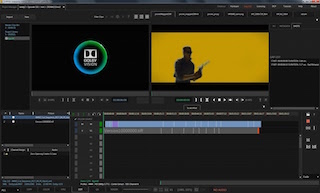MTI Film, maker of the Cortex family of set-to-screen workflow software, has just been awarded U.S. Patent 10,349,097 for its Graphical Editing Solution for High Dynamic Range Metadata. The software tool provides a simple way to ensure that HDR metadata is properly aligned with associated HDR video. It saves time and eliminates errors in preparing feature film and television content for delivery in formats including Dolby Vision HDR.
 MTI Film’s Graphical Editing Solution for HDR Metadata is designed for use within Cortex after the color-correction phase of post-production. When films and television shows are color corrected, it is common, and often useful, for picture data and color metadata to be separated. However, the two must be brought back together and lined up perfectly when the content is assembled in its final format, such as a Dolby Vision™ HDR IMF package for delivery to Netflix.
MTI Film’s Graphical Editing Solution for HDR Metadata is designed for use within Cortex after the color-correction phase of post-production. When films and television shows are color corrected, it is common, and often useful, for picture data and color metadata to be separated. However, the two must be brought back together and lined up perfectly when the content is assembled in its final format, such as a Dolby Vision™ HDR IMF package for delivery to Netflix.
As frame-by-frame tone mapping of color is defined in the metadata, any timing or level issues will appear as color errors or flashes in the subsequently tone-mapped versions of the images. Such problems can be challenging and time consuming to correct and must be resolved before final delivery.
The graphical editing solution in Cortex solves this problem by presenting complex Dolby Vision metadata as a simple, colorfully populated timeline track. An operator can manipulate the timing, duration and placement of the timeline track through industry-familiar drag-and-drop editing. The operator can trim and edit the HDR color metadata track, and visually verify cuts and synchronization with the video track. The fidelity of metadata values and their frame-accurate placement with respect to video are easily verified by color-coded timeline marks and real-time numerical displays. Discrepancies are automatically flagged and listed for the user providing easy resolution.
“MTI Film’s Graphical Editing Solution for HDR Metadata addresses one of the most common challenges in preparing Dolby Vision HDR delivery packages,” says MTI Film director of product development Randy Reck. “The puzzle of accurately assembling HDR content with its HDR metadata has now been solved.”
MTI Film www.mtifilm.com
